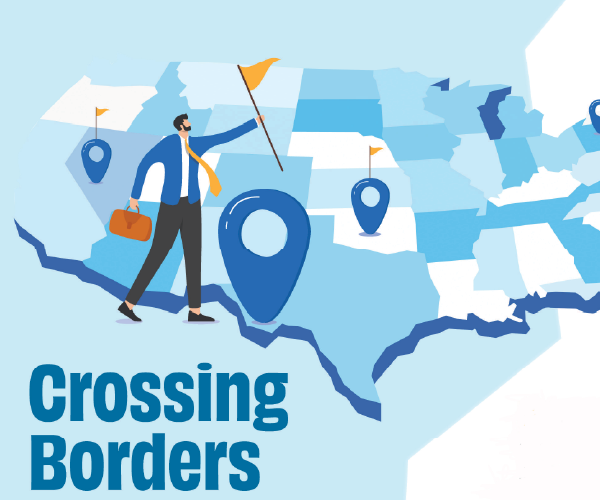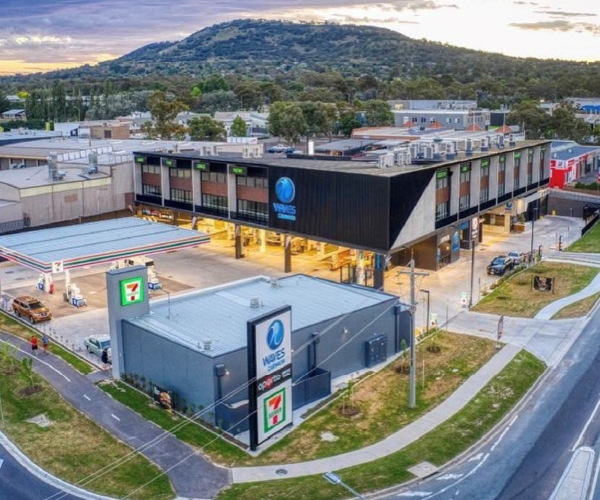
Ready, Set, Grow!
March 8, 2018
8 minute Read
Verne Harnish is not the type of guy who settles for good enough. As the founder of the Young Entrepreneurs’ Organization, now known as the Entrepreneurs’ Organization, Harnish has always believed that once a business plan proves successful, it’s time to think bigger.
Known as the “Growth Guy” syndicated columnist and a columnist for Fortune magazine, Harnish is the founder and chief executive of Gazelles, a global executive education and
coaching company with more than 150 coaching partners on six continents. He’s spent the past three decades helping companies scale up and he includes many of his growth strategies in his most recent book, “Scaling Up: How a Few Companies Make It ... and Why the Rest Don’t.”
Harnish said small business owners such as carwash operators often are hesitant to scale up because of the financial risks and extreme time commitment, but by learning how to delegate responsibility and employ proven growth strategies, they can take their businesses to the next level.
“People want to work less and make more money, and it seems to go the opposite way,” Harnish said. “We joke that an entrepreneur would rather work 16 hours for himself than eight hours for someone else. Well, it quits being a joke after a while and starts to wear you out. It’s OK to be independent, but there’s no reason to be alone.”
Harnish said that when planning to scale up a business, there are three key areas of focus: people, brand strategy and execution.
Harnish points to the example of Tony Hartl, who started the Planet Tan chain of tanning salons. Hartl had seven salons in the Dallas area when he got the idea to become the official tanning salon of the Dallas Cowboys cheerleaders. He also paid the celebrity entrepreneur Mark Cuban, who owns the Dallas Mavericks, to be the face of the business in radio and print advertising and sponsored the Mavericks cheerleading team’s calendar.
Such sponsorship agreements obviously can be expensive, but for a successful brand looking to expand, the benefits are obvious. Hartl’s chain rapidly expanded to 17 locations and 160 employees, and in 2008, he sold the business and began traveling the world. Harnish said car wash operators needn’t seek out high-priced celebrity endorsements to benefit from this idea.
Local celebrities like a celebrated high school football coach or newspaper columnist can help set your business apart from your competitors.
“Lesson No. 1 is to identify the right people to get behind your business,” Harnish said. “Make a list of the key influencers and reference customers who would really help to scale up your business if you could get their support, and work that list.”
“If you don’t own a little bit of mindshare like that, then you really don’t have a brand, and I don’t think people think about that enough,” Harnish said.
The concept views any manageable system as being limited in achieving more of its goals by a very small number of constraints, and by restructuring the organization to address these constraints, small businesses can achieve rapid growth.
Harnish points to the example of Costco, which used the counterintuitive idea of charging customers a membership fee to shop in its stores in order to fund its growth. In the
first quarter of 2017, the company reported that 72 percent of its operating income now comes from membership fees, which enables it to sell many of its items for little to no profit.
Harnish said car wash operators already are following this model to some extent through loyalty clubs, unlimited-wash options and gift cards, which are especially attractive to small business owners because they get all the cash up front, and recipients often sit on them for long periods of time, fail to use them altogether or spend considerably more money than the card is worth when they do visit the store. But the Costco example proves that it just takes one innovative idea to address a key constraint and spur growth, Harnish said.
“You’ve got to figure out the thing that is constraining your business, that pebble in your shoe, and put all of your effort and time there because to focus on anything else is just a waste,” he said.
Harnish recommended that carwash operators read “The Customer-Funded Business: Start, Finance, or Grow Your Company with Your Customers’ Cash,” by John Mullins, for ideas about how to fund growth through customers instead of bank loans.
OTHER THINGS TO CONSIDER
Harnish said one clue that it’s time for a car wash operator to open a new location is when he notices that customers from other neighborhoods are willing to drive to his car wash because it has built a reputation for doing an exceptionally good job. Many carwashes input customers’ names and addresses into a database, and a thorough review of where one’s customers are coming from can reveal where a new location might thrive.
“If they’ve heard that you’re really good and are willing to drive past other places to get to your carwash, that’s your biggest sign,” he said.
Don’t send your best talent to run a new location unless you have someone ready to step in at your flagship location, Harnish said. He points to the example of Debbi and Randy Fields, who opened the first Mrs. Fields Cookies store in Palo Alto, Calif., and later moved the company’s headquarters to Park City, Utah. One of the first places they expanded to was Hawaii because it was their favorite vacation spot, and they sent their best workers to the new location.
Shortly thereafter, the couple noticed that revenue at its main location in Utah had dropped. Too many or too few cookies were being prepared daily, and the cookies just didn’t taste the same. To address the problem, Randy Fields spelled out in great detail the recipes and procedures for baking cookies and came up with a system where managers could use sales data to estimate how many cookies of each flavor the store should bake on a particular day.
Car wash operators with multiple locations can do the same thing with their procedures for greeting customers, maintaining equipment and other business operations, Harnish
said. Take the time to write it down and spell it out clearly, and employees will be more likely to stick to the script. “The key to multiple locations is consistency, standard operating procedures,” he said.
And before using your best talent to launch a new location, have a mentoring program in place so that your key employees can train their replacements. By promoting from
within, carwash operators are more likely to retain their best workers.
Harnish said that since scaling up also usually requires additional manpower, it’s important for car wash operators to build their bullpen. Is there a particular fast-food restaurant where the service is consistently exemplary? Are you friendly with a teacher who is especially adept at identifying reliable and hardworking students? By identifying these resources, car wash operators can get a leg up when seeking to hire the best candidates.
In many cases, established brands can do some of the work for you, Harnish said. Large retail chains like McDonald’s have extensive training programs that give employees
customer service skills that often are transferrable to other businesses such as car washes. Therefore, recruiting employees from trusted brands can give car wash operators confidence that their new location has a solid team in place. The grand opening of a new location is the wrong time to be ironing out the kinks.
“A lot of great companies recruit out of the big guys,” Harnish said. “They get these talented young people, they train them up and beat them up, and then you can kind of take them under your wing and give them an opportunity. It’s important for every business to have a source to steal talent from.”
Since consistency across locations is vital, carwash operators should make frequent unannounced visits to each location to supervise operations. But since you can be in only one place at a time, and employees will be on their best behavior when the boss is around, a secret shopper can help car wash operators ensure that the company’s strategy is being employed.
Give a friend a checklist and ask him to visit your carwash at your expense. Is each employee wearing his name badge? Is each customer greeted warmly and professionally?
Are frontline workers promoting add-ons like air fresheners, gift cards and loyalty programs? Are car doors held open for customers? A secret shopper who knows exactly what the car wash operator is looking for from employees can provide a true picture of the car wash’s customer service, Harnish said. He added that this approach often is more effective and less costly than installing remote monitoring devices that allow car wash operators to keep an eye on multiple locations at once.
“It’s more important that you understand the experience through the customers’ eyes, not your own,” he said. “That’s why I’d rather you give a customer a few free car washes
and say, ‘Go in, and look for these five things.’ ”
Harnish said one common mistake among small business owners who are looking to scale up is that they don’t set aside enough of the company’s profits to secure a future for themselves. By constantly dedicating capital to scaling up, car wash operators can leave themselves one economic recession or business setback away from financial ruin.
There’s nothing wrong with taking some chips off the table, he said.
“Small business owners often find that when it’s time to retire, they have all their wealth tied up in their business, and God forbid something happens to it,” Harnish said.
Known as the “Growth Guy” syndicated columnist and a columnist for Fortune magazine, Harnish is the founder and chief executive of Gazelles, a global executive education and
coaching company with more than 150 coaching partners on six continents. He’s spent the past three decades helping companies scale up and he includes many of his growth strategies in his most recent book, “Scaling Up: How a Few Companies Make It ... and Why the Rest Don’t.”
Harnish said small business owners such as carwash operators often are hesitant to scale up because of the financial risks and extreme time commitment, but by learning how to delegate responsibility and employ proven growth strategies, they can take their businesses to the next level.
“People want to work less and make more money, and it seems to go the opposite way,” Harnish said. “We joke that an entrepreneur would rather work 16 hours for himself than eight hours for someone else. Well, it quits being a joke after a while and starts to wear you out. It’s OK to be independent, but there’s no reason to be alone.”
Harnish said that when planning to scale up a business, there are three key areas of focus: people, brand strategy and execution.
PEOPLE: FIND THE KEY INFLUENCERS.
Are there well-recognized and important people in your community whose association with your carwash would add credibility to your business? Finding a way to bring them into the fold is one of the best ways to prepare your brand for growth, Harnish said.Harnish points to the example of Tony Hartl, who started the Planet Tan chain of tanning salons. Hartl had seven salons in the Dallas area when he got the idea to become the official tanning salon of the Dallas Cowboys cheerleaders. He also paid the celebrity entrepreneur Mark Cuban, who owns the Dallas Mavericks, to be the face of the business in radio and print advertising and sponsored the Mavericks cheerleading team’s calendar.
Such sponsorship agreements obviously can be expensive, but for a successful brand looking to expand, the benefits are obvious. Hartl’s chain rapidly expanded to 17 locations and 160 employees, and in 2008, he sold the business and began traveling the world. Harnish said car wash operators needn’t seek out high-priced celebrity endorsements to benefit from this idea.
Local celebrities like a celebrated high school football coach or newspaper columnist can help set your business apart from your competitors.
“Lesson No. 1 is to identify the right people to get behind your business,” Harnish said. “Make a list of the key influencers and reference customers who would really help to scale up your business if you could get their support, and work that list.”
BRAND STRATEGY: OWN A WORD OR PHRASE.
Volvo has the word “safety,” Nike has “Just do it,” Bounty paper towels are “the quicker picker upper,” and M&M candies famously “melt in your mouth, not in your hands.” Any brand seeking to scale up should identify a keyword or slogan that it can make synonymous with its brand name for the long term, Harnish said. By owning a word or phrase such as “clean,” “soapy” or “fast,” car wash operators can ensure that when they open a new location, some potential customers already know something appealing about that business without having ever been there.“If you don’t own a little bit of mindshare like that, then you really don’t have a brand, and I don’t think people think about that enough,” Harnish said.
EXECUTION: IDENTIFY WHAT IS CONSTRAINING YOUR BUSINESS.
There is usually at least one factor preventing your business from expanding, and addressing it head on is essential, Harnish said. He recommended that carwash operators read “The Goal: A Process of Ongoing Improvement,” by Eliyahu M. Goldratt and Brad Cox, which explores the “theory of constraints.”The concept views any manageable system as being limited in achieving more of its goals by a very small number of constraints, and by restructuring the organization to address these constraints, small businesses can achieve rapid growth.
Harnish points to the example of Costco, which used the counterintuitive idea of charging customers a membership fee to shop in its stores in order to fund its growth. In the
first quarter of 2017, the company reported that 72 percent of its operating income now comes from membership fees, which enables it to sell many of its items for little to no profit.
Harnish said car wash operators already are following this model to some extent through loyalty clubs, unlimited-wash options and gift cards, which are especially attractive to small business owners because they get all the cash up front, and recipients often sit on them for long periods of time, fail to use them altogether or spend considerably more money than the card is worth when they do visit the store. But the Costco example proves that it just takes one innovative idea to address a key constraint and spur growth, Harnish said.
“You’ve got to figure out the thing that is constraining your business, that pebble in your shoe, and put all of your effort and time there because to focus on anything else is just a waste,” he said.
Harnish recommended that carwash operators read “The Customer-Funded Business: Start, Finance, or Grow Your Company with Your Customers’ Cash,” by John Mullins, for ideas about how to fund growth through customers instead of bank loans.
OTHER THINGS TO CONSIDER
Harnish said one clue that it’s time for a car wash operator to open a new location is when he notices that customers from other neighborhoods are willing to drive to his car wash because it has built a reputation for doing an exceptionally good job. Many carwashes input customers’ names and addresses into a database, and a thorough review of where one’s customers are coming from can reveal where a new location might thrive.
“If they’ve heard that you’re really good and are willing to drive past other places to get to your carwash, that’s your biggest sign,” he said.
Don’t send your best talent to run a new location unless you have someone ready to step in at your flagship location, Harnish said. He points to the example of Debbi and Randy Fields, who opened the first Mrs. Fields Cookies store in Palo Alto, Calif., and later moved the company’s headquarters to Park City, Utah. One of the first places they expanded to was Hawaii because it was their favorite vacation spot, and they sent their best workers to the new location.
Shortly thereafter, the couple noticed that revenue at its main location in Utah had dropped. Too many or too few cookies were being prepared daily, and the cookies just didn’t taste the same. To address the problem, Randy Fields spelled out in great detail the recipes and procedures for baking cookies and came up with a system where managers could use sales data to estimate how many cookies of each flavor the store should bake on a particular day.
Car wash operators with multiple locations can do the same thing with their procedures for greeting customers, maintaining equipment and other business operations, Harnish
said. Take the time to write it down and spell it out clearly, and employees will be more likely to stick to the script. “The key to multiple locations is consistency, standard operating procedures,” he said.
And before using your best talent to launch a new location, have a mentoring program in place so that your key employees can train their replacements. By promoting from
within, carwash operators are more likely to retain their best workers.
Harnish said that since scaling up also usually requires additional manpower, it’s important for car wash operators to build their bullpen. Is there a particular fast-food restaurant where the service is consistently exemplary? Are you friendly with a teacher who is especially adept at identifying reliable and hardworking students? By identifying these resources, car wash operators can get a leg up when seeking to hire the best candidates.
In many cases, established brands can do some of the work for you, Harnish said. Large retail chains like McDonald’s have extensive training programs that give employees
customer service skills that often are transferrable to other businesses such as car washes. Therefore, recruiting employees from trusted brands can give car wash operators confidence that their new location has a solid team in place. The grand opening of a new location is the wrong time to be ironing out the kinks.
“A lot of great companies recruit out of the big guys,” Harnish said. “They get these talented young people, they train them up and beat them up, and then you can kind of take them under your wing and give them an opportunity. It’s important for every business to have a source to steal talent from.”
Since consistency across locations is vital, carwash operators should make frequent unannounced visits to each location to supervise operations. But since you can be in only one place at a time, and employees will be on their best behavior when the boss is around, a secret shopper can help car wash operators ensure that the company’s strategy is being employed.
Give a friend a checklist and ask him to visit your carwash at your expense. Is each employee wearing his name badge? Is each customer greeted warmly and professionally?
Are frontline workers promoting add-ons like air fresheners, gift cards and loyalty programs? Are car doors held open for customers? A secret shopper who knows exactly what the car wash operator is looking for from employees can provide a true picture of the car wash’s customer service, Harnish said. He added that this approach often is more effective and less costly than installing remote monitoring devices that allow car wash operators to keep an eye on multiple locations at once.
“It’s more important that you understand the experience through the customers’ eyes, not your own,” he said. “That’s why I’d rather you give a customer a few free car washes
and say, ‘Go in, and look for these five things.’ ”
Harnish said one common mistake among small business owners who are looking to scale up is that they don’t set aside enough of the company’s profits to secure a future for themselves. By constantly dedicating capital to scaling up, car wash operators can leave themselves one economic recession or business setback away from financial ruin.
There’s nothing wrong with taking some chips off the table, he said.
“Small business owners often find that when it’s time to retire, they have all their wealth tied up in their business, and God forbid something happens to it,” Harnish said.







